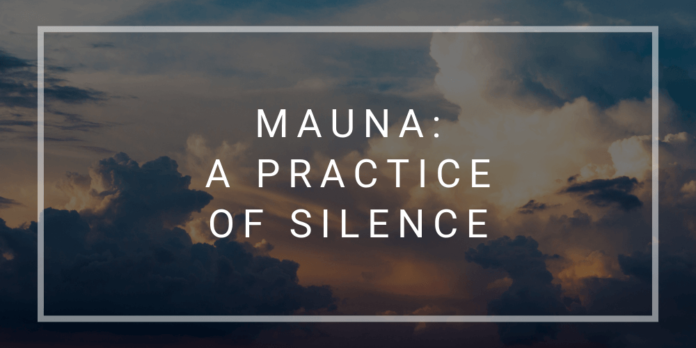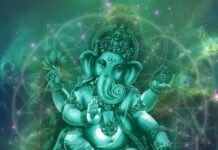Mauna refers to the practice of not-speaking, and one who does this regularly is called a Muni, a sign of great respect in Hindu and yogic thought. While not-speaking is an important part of Mauna, it is much more than that.
By Dr David Frawley
Certainly, most of us would be better off speaking less and not responding quickly at a verbal level to anything that arouses or irritates our emotions. The voice is the foremost of our motor organs. It relates to the element of ether that governs all the other elements and their respective motor organs. Yet an inner speech is also the main expressive factor of the mind and governs all mental activity.
Our lives consist of the two main actions of eating and speaking, what comes into and what goes out of the mouth. If we can master these two, we can master everything about the body and the physical world and its karmic complications. Speech is where we lose the most energy or prana, and what drives us to wrong action and various entanglements. What we have said eventually comes back to us. Speech is the first and foremost of our weapons and harsh words usually precede or accompany violence and abuse. Yet speech is also the first and foremost of the help and affection we offer in life, which usually begins with words of kindness or love. We must not forget the karma in what we say, which is the action our words compel us to, and the energies they set in motion within and around us.
However, merely not speaking is not enough. Sometimes in the face of injustice we are compelled to forcefully speak out. This is not necessarily in violation of Mauna. Not speaking out against injustice is complicity and another form of injustice.
Silence of Mind
Outer verbal silence means little without inner silence of mind. Most of us are speaking through our thoughts all the time, either to ourselves or to imagined other people we are involved with or would like to influence, plotting and rehearsing what we would like to say to them.
Sadly, our thoughts are more erratic, disturbed, over emotional or out of control than what we say because they move more quickly and don’t have to face direct resistance from the outside that speaking to others entails.
Yet we cannot have silence of mind without a corresponding control of the vocal organ. Silence of speech, speaking little, speaking kindly, speaking the truth, or chanting mantras are among the best spiritual practices, and form the foundation for a genuine sadhana.
In many ways, Mauna is more important than asana. Without Mauna or silence of outer and inner speech, any asana will be cluttered with thoughts and unnecessary verbiage, like blockages in the muscles. Mauna creates stability for the mind, a seat or asana for the meditation.
Mauna is necessary for pranayama because speech and thought are the main areas where we waste or lose prana. Speech arises from exhalation. If we cannot control speech we cannot control exhalation or breathing overall.
Mauna is the basis of pratyahara, which is control of the senses and motor organs from the standpoint of a higher awareness. Without mastery of speech, there can be no control of the senses or motor organs on any level.
Mauna and Higher Yoga Practices
Mantra works best if it is chanted in a state of silence of mind or inner Mauna. Conversely, mantra aids in developing silence of mind. The sadhaka should take the mantra from the spoken state, to a state of gentle resonance and repetition along with the breath, to a silent repetition by the mind, and ultimately to a vibration of silent awareness.
The Divine Word and cosmic mantras starting with OM and HREEM are the sounds of silence that we can only enter into with a silent mind and receptive heart. Cosmic mantric vibrations are the sounds of universal space, in which there is no friction or noise. This is the space of consciousness, Chidakasha. Entering into that all limitations of time, place and person disappear.
As such, Mauna is the foundation for dharana or concentration. If we don’t have silence of speech and mind, how can we concentrate our attention, or fix our gaze within.
Mauna is the basis for dhyana or meditation because silence of speech and mind is the basis for holding the reflective state of meditation in which the mind becomes still like a mirror. Meditation on silence and silent meditation go together and give us inner peace.
Mauna is the basis of samadhi, the unitary state of pure consciousness, which literally takes away our speech, mind and breath that are interconnected. If we are not made silent in speech and mind, we are not in samadhi.
Speech as Sacred and as the Goddess
We should honor speech as sacred. Then we will not so quickly indulge in verbal wastage and abuse. A simple way to do this is to honor speech, both our own vocal organ and speech as a universal power from which it manifests, in the form of Devi Saraswati, along with her bija mantra AIM.
Ma Saraswati rules the tongue and vocal organ and the throat chakra, including music, poetry and mantra, lifting us to silence of speech and mind. If we don’t honor Saraswati in our speech, our speech will become violent, vulgar, destructive and disintegrating to our own psychological wellbeing.
The vulgar and rude way of speech and expression that marks our current supposedly high tech culture is a caught for great concern from a spiritual perspective. It shows that there is much violence and agitation brewing within us that must eventually manifest at individual and collective levels. When our speech starts to get harsh or disturbed we should remember Saraswati. Without her grace there is not spirituality, art, wisdom or even meaningful knowledge.
Yet all the Goddesses or Devis relate to different aspects of speech or the Divine Word and its power as Vak-shakti. Tripura Sundari also relates to the seeing everything as sacred or Divine, everything in nature as manifestation of the Divine Word or cosmic creative force, everything as Brahman.
Kundalini Shakti herself is the power of the Divine Word within, which is why she is said to be composed of the letters of the Sanskrit alphabet that reflects cosmic sound vibrations. Without Mauna Kundalini Shakti cannot arise in her true form and power of transformation.
Mauna implies honoring the Goddess, following the muse and the Yoga Shakti, through which all life proceeds and evolves.
Conclusion
In short, Mauna is one of the key Yoga practices and sometimes made into a limb of Yoga itself. Even the Yamas and Niyamas like ahimsa, satya and brahmacharya require Mauna to develop. Similarly tapas, svadhyaya and Ishvara pranidhana imply control of speech.
Vairagya or detachment is rooted in control of speech and gives control of speech.
Viveka or inner discernment is only possible when we observe rather than react at a vocal level.
Only through Mauna can we enter into the guha or secret cavern of the heart in which the entire universe dwells in its true luminous. In the end all words mean nothing or everything, true meaning and sound being our oneness with all.
The way to Self realization is through silence that is the greatest teacher and greatest power of knowing as Bhagavan Ramana Maharshi taught.
Article Courtesy : www.vedanet.com








